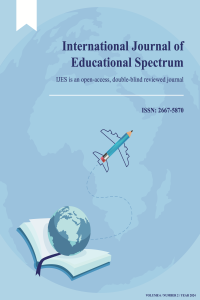Research Articles
Systematic Reviews and Meta Analysis
7. Coursebook Evaluation and Development in a Vocational College: A Pilot StudyIssue Editorial Board
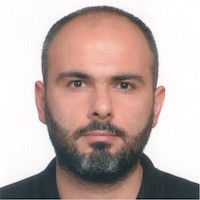

Prof.Dr. Michael F. Shaughnessy is currently Professor of Educational Studies at Eastern New Mexico University in Portales, New Mexico USA. He has served as Editor in Chief of Gifted Education International and can be reached electronically at Michael.Shaughnessy@enmu.edu. His orcid i.d. is 0000 0002 1877 1319. His current research interests include talent development and intellectual assessment as well as the role of personality in giftedness, talent and creativity.
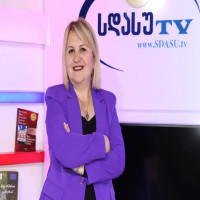
Ph.D. in Political Science, head of Non-Profit Organization Multicultural Group, professor and a head of International Relations Bachelor’s program, Faculty of Law and International Relations, Georgian Technical University; Head of Public Relations and Internationalization Department, David Aghmashenebeli University of Georgia; Head of the Department of International Relations, Research Center for the Study of Georgian Complex Development Issues, Tbilisi State University; Member of the Higher Education Sectoral Council for Conflict Studies, LEPL - National Center for Education Quality Development. She received her bachelor's degree in Languages and Literature, and has been awarded a qualification of Philologist of English Language and Literature and Spanish Language and Literature, Ilia Chavchavadze State University, Tbilisi, Georgia. Has a master's degree in International Relations and Politics from the Diplomatic Academy of Georgia. Has supervised 3 PhD and 2 MA theses; completed 3 grant projects (Migration Processes in the Modern World: Perspectives and Challenges; and Gender Equality and Violence in the Modern World, financed by Georgian Technical University), and “Non-EU Europe” (held and financed by at Rhine-Waal University of Applied Sciences in Kleve, Germany). Is a participant of the Erasmus + International Master Program in Gender and Security (the consortium of 5 universities, the project will start in September). She is a member of the editorial board of 16 International Journals, the editor of 12 books (IGI Global Publisher, USA, and IJOPEC Publication, London -Istanbul), the author of more than 40 scientific papers and 14 book chapters, a participant in 12 various Erasmus + Projects (KA1, KA2, etc.), a participant of more than 60 international scientific conferences (mostly as a keynote and majority abroad), and organizer of various international scientific conferences and workshops. Also, she is an expert in the Institute for Research and European Studies, Expert Network, Bitola; The chair of postdoctoral studies at European Scientific Institute, Kocani, Republic of Macedonia; A jury member of in European Capital of Democracy; A jury member of Innovation in Politics Awards, Vienna; Co-founder of Rotary Club Tbilisi Academia.
Her research interests are religion, migration, religious tourism, and European and Russian studies. She is fluent in the following languages: English, Russian, Georgian, Greek, Azerbaijani and Armenian.
Issue Reviewers
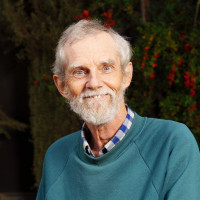
ALBRECHT CLASSEN is Univ. Distinguished Professor at the University of Arizona. He has a broad range of research interests covering the history of German and European literature from about 800 to 1600. He has currently published 134 books and well over 835 articles dealing with comparative issues, gender topics, environmental concerns, and cultural historical themes. Most recently appeared Criticism of the Court the Evil King in Medieval Literature (2024). In 2017, he received the rank of Grand Knight Commander of the Most Noble Order of the Three Lions. He is also a productive poet and author of short prose narratives.

Ben Bekir Yıldız. Lisans, yüksek lisans ve doktora eğitimimi sınıf öğretmenliği alanında tamamladım. Çalışmalarım çocuk edebiyatı, Türkçe eğitimi, dil becerileri ve ilkokuma yazma öğretimi alanlarında yoğunlaşmaktadır.
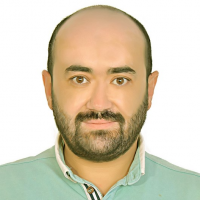

David Guadalupe Toledo Sarracino is a full time professor and researcher at the School of Languages at Universidad Autónoma de Baja California in Tijuana. He is a holder of a B.A. in Language Teaching granted by Universidad Juárez Autónoma de Tabasco, a Diploma in Language Teaching by the Cambridge University in The UK, a Master´s degree in Teaching granted by Universidad Autónoma de Baja California and a Ph.D. in Linguistics granted by Universidad Autónoma de Querétaro in Mexico. He is a former Fulbright scholar at the Education Studies Department-UCSD. His lines of research are discourse analysis, language policy and teacher training in foreign languages. He is author of a wide variety of books, articles and chapters in language teaching. He is member of TESOL, CATESOL, MEXTESOL, CIESPAL and a member of the national evaluation system at Consejo para la Acreditación de Programas en Humanidades COAPEHUM], A.C. and member of the National System of Research CONAHCyT.
Elizabeth Us Grajales is a full time second language teacher educator at the Autonomous University of Chiapas, and has been awarded the COTE, a MEd degree in ELT Trainer Development from the University of Exeter, UK, a PhD in Regional Studies. She is a member of the Academic Body “Professional Development, Inclusion, Assessment in Language Teaching” and has developed research projects and written academic articles on assessment, indigenous languages, language, inclusion, and culture, among others.
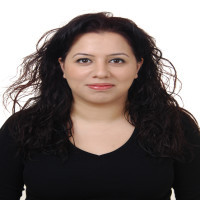
Dr. F. Sehkar Fayda-Kinik is currently a senior lecturer at Istanbul Technical University, Turkey. After gaining her Master’s degree in Educational Administration and Supervision, she started to work for Istanbul Technical University as a lecturer embracing teaching undergraduate students and research. Before embarking on an academic career, she got her Ph.D. degree in Educational Administration and Supervision. Her research has embraced educational sciences with a special emphasis on higher education, knowledge management, professional development, technology in education, leadership, and organisational culture. She is currently a member of the International Study Association on Teachers and Teaching (ISATT), the British Educational Leadership, Management and Administration Society (BELMAS), and the International Academic Forum (IAFOR).
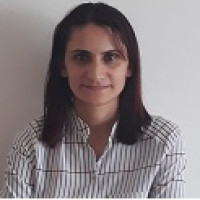
Dr. Menşure ALKIŞ KÜÇÜKAYDIN completed her undergraduate education at Gazi University, her graduate education at Gaziosmanpaşa University, and her doctorate at Amasya University. Dr. ALKIŞ KÜÇÜKAYDIN is a faculty member at Necmettin Erbakan University. Dr. ALKIŞ KÜÇÜKAYDIN's research interests include professional development of classroom teachers and teacher candidates, science and pseudoscience, science identity, science image, scientific reasoning, and use of technology in science education.
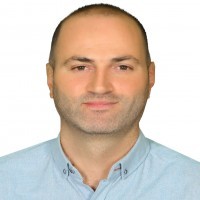
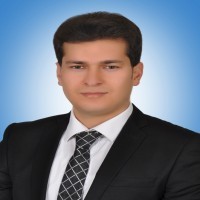
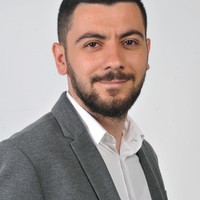
Dr. Tolga TOPCUBAŞI, lisans eğitimini 2007-2011 yılları arasında Mersin Üniversitesi İlköğretim Bölümü Sınıf Öğretmenliği programında tamamladı. 2012-2015 yılları arasında ise Kocaeli Üniversitesi Sosyal Bilimler Enstitüsü Temel Eğitim Anabilim Dalı Sınıf Öğretmenliği tezli yüksek lisans programında yüksek lisans eğitimini tamamladı. Yüksek lisans tezinde farklılıklara saygı eğitim programının öğrencilerin farklılıklara saygı tutumu düzeylerine etkisini inceledi. Doktorasını 2015-2020 yılları arasında Marmara Üniversitesi Eğitim Bilimleri Enstitüsü Temel Eğitim Anabilim Dalı Sınıf Öğretmenliği programında yapmıştır. Doktora tezinin konusu ise hayat bilgisi dersinde gazete haberleriyle desteklenmiş örnek olay yönteminin etkililiğine yönelik bir eylem araştırmasıdır. 2011 yılından itibaren MEB’e bağlı okullarda ve BİLSEM' de sınıf öğretmeni olarak görev yapmıştır. 2022 yılı Haziran ayı itibariyle İstanbul 29 Mayıs Üniversitesi Eğitim Fakültesi Temel Eğitim Bölümü Sınıf Eğitimi Anabilim Dalı’nda Doktor Öğretim Üyesi olarak çalışmalarını sürdürmektedir. Çalışma alanları; hayat bilgisi eğitimi, sosyal bilgiler eğitimi, değerler eğitimi ve temel eğitimdir.


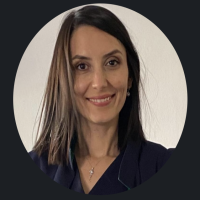
Assist. Prof. Dr. İrem GÜRGAH OĞUL completed her undergraduate education in the Department of Early Childhood Education at Middle East Technical University. She then completed her master's and doctoral studies in the same department at Çukurova University, earning her doctorate degree. She continues to train teachers as an assistant professor in the Department of Early Childhood Education at Izmir Democracy University. She contributes to the field with her national and international publications, which include topics such as at-risk children, mathematics education, parent education, co-parenting, and resilience, and continues her work to ensure that children grow up in a better world.
Aim & Scope
The International Journal of Educational Spectrum (IJES) is an internationally refereed scholarly journal published online every six months. It started publishing academic articles in 2019. IJES is an open-access and double-blind-reviewed journal that aims to involve scholars from all international academic and professional communities.
The journal supplies a platform for diverse theoretical and thematic approaches to educational sciences. IJES includes a wide range of research methods (case study, ethnography, phenomenological research, narrative research, historical research, quantitative research− descriptive survey research, experimental research, single-subject research, causal-comparative research, correlational research, and meta-analysis, etc.). The articles inquiring noteworthy research questions from a wide range of perspectives are encouraged to be sent to IJES. IJES welcomes theoretically or practically original articles previously unpublished anywhere. The articles sent to IJES cannot be published or under review elsewhere. All submitted papers will be initially reviewed and assessed by the editorial board in terms of the requirements of the journal. The articles which are found suitable and acceptable by the editorial board will be submitted for scientific assessment to referees. Authors are responsible for any view stated in the articles. In IJES, both English and Turkish articles are published (English only from 2023).
Author Guidelines
Authors need to use IJES Manuscript Template to format their manuscript.
1) In IJES (International Journal of Educational Spectrum), the articles and reviews are submitted for evaluation.
2) The articles submitted to the journal should not be previously published anywhere or should not be under review at any other journal.
3) If the articles, partly or full, were previously submitted to a conference, symposium or an assembly, they could be published if they are approved by the publication board, providing the date and venue are defined. All responsibility for this issue belongs to the authors.
4) The articles submitted to IJES (International Journal of Educational Spectrum) are initially examined by the editorship. If there is any part that should be corrected, the article is returned to the corresponding author who is required to make related corrections. So, the authors have to add their personal data (Name-surname, Institution, E-mail address, ORCID number) in the Word file of the manuscript. After the preliminary assessment, all the personal data are deleted by the editor before the blind review process.
5) The articles which do not correspond to the publication principles are not sent to referees to be reviewed and consequently not published.
6) This journal uses double-blind review, which means that both the reviewer and author identities are concealed from the reviewers, and vice versa, throughout the review process. To facilitate this, authors need to ensure that their manuscripts are prepared in a way that does not give away their identity. The articles approved by the editorship are sent to at least two referees to be reviewed. If it is required, the manuscript may be sent to more than two referees to examine. The final decision about the paper to be published is made by the majority of referees. Any recommendation stated by the referees is carefully followed by the editor. The journal has the right to make corrections in the articles and publish or reject them. The names, affiliations, and e-mails of the authors will be added in the papers. In the blind-review process, all the author related data will be deleted by the editors.
7) The authors may object to the negative views of the referees providing they submit evidence. This objection is examined and if it is required, opinions of different referees can be benefitted.
8) The authors will be informed about the published volume of the journal.
9) The overall process is conducted online.
10) The paper should start with an “introduction” part containing the approaches in the literature about the aim, content, and the methods of the study. There should be a “result” part in which the findings are examined. (Abstract, Introduction, Methodology, Findings, Discussion, Conclusion)
11) In the beginning of the manuscript, there should be a (200-250 words) abstract (English and Turkish) which shortly describes the study. 3-5 keywords should be included by leaving one blank line from the abstract. The text of the abstracts, both in English and Turkish should be written with 10 font size, using Times New Roman font and leaving one blank line.
12) The APA style must be strictly followed by the papers.
13) The papers should not pass the limit of 25 pages including notes, tables, figures, graphics, pictures and references. Numbers should be given for the tables, figures, graphics, and pictures, and when they are used in the text, the numbers should be mentioned.
14) The articles should be written in Word for Windows in order to accelerate the process of composition, correction and edition.
15) The language of the journal is English.
16) The author is responsible for any kind of grammar or spelling problems.
17) The copyrights of the articles are reserved by the journal and they cannot be published, multiplied or used without giving a reference in anywhere unless it is permitted.
18) In the articles, the last version of APA should be employed. Further, the accuracy of the sources is of the responsibility of the authors.
19) Even if the articles sent to IJES completed the referee process, they may be rejected by the editorship board.
20) The articles sent to IJES should be prepared with the American Psychological Association (APA 7) in the reference system, footnotes and preparing references.
21) IJES Plagiarism Policy: Similarity Check is a multi-publisher initiative to screen published and submitted content for originality. IJES uses the iThenticate software to detect instances of overlapping and similar text in submitted manuscripts.
22)IJES is free of charge. The journal does not charge any article submission, processing or publication fee.
23) About the principles of spelling and publication, the abridged version of the expressions above is given below.
Paper size | A4 |
Top margin | 2.5 |
Bottom margin | 2.5 |
Left margin | 2.5 |
Right margin | 2.5 |
Type font | Times New Roman |
Font Style | Normal |
Font size | 12 |
Line spacing | 1.15 |
Maximum page number (all included) | 25 |
Word count in Abstract | 200-250 |
The range of keywords | 5 |
Ethical Principles and Publication Policy
Publication Policy
Any research paper published in International Journal of Educational Spectrum (IJES) is licensed with "Creative Commons Attribution 4.0 International License". This license authorizes all parties to copy, share and distribute all the papers, data, and supplementary files published in IJES in search engines, websites, and any other digital platforms as long as supplying references. Being an open access research journal, IJES eases the interdisciplinary communication and fosters cooperation among diverse disciplines. Thus, IJES assists its own field by supplying more access to its research papers and a more evident review process.

Price Policy
IJES is available free-of-charge to anyone with access to the Internet, and there are no article submission or access charges for publication.
.









